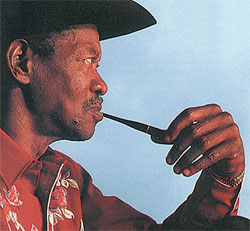Elijah Wald – Gatemouth Brown profile |
| Back
to the Books and Other Writing page Back to the Archive Contents page GATEMOUTH BROWN WON'T BE STUCK IN A MOLD Other people may call Clarence (Gatemouth) Brown a blues player. He prefers to say that he plays "American music." A typical Brown set includes hot Cajun fiddling, swinging jazz, a couple of country songs, and oddities like a Latin arrangement of "Frankie and Johnny," as well as plenty of slashing Texas blues guitar. Brown, who appears tomorrow at the House of Blues in Cambridge, was born in Louisiana, but grew up across the Sabine River in Orange, Texas. "I started out on guitar at the age of 5 and then tried the fiddle at 10," he says. "In the beginning, it was country, Cajun and bluegrass, 'cause that's what my father played. He played all the string instruments, plus an accordion, and being the elderly son I wanted to be as close to him as I could." Keeping his ears open, Brown was soon mixing those country roots with hipper sounds from records and the radio. "I started listening to big bands like Count Basie, Louis Jordan," he says. "That sounded good to me, and I liked to add it with my repertoire, which I did." The big-band guitarists were straight rhythm players, but Brown says he wanted another sound. "I do horn lines," he explains. "I can do comping, rhythm playing, but I like the way horns sound. And I don't like the way the average guitar player sounds; they're all doing that same whining thing." His main guitar influence in those days was T-Bone Walker, the Texan "jump blues" star who virtually invented blues lead playing. However, Brown soon decided that Walker's approach was too limited. "He was the motivator of Texas blues," Brown says. "But after a while I would listen to him and I saw him meeting himself coming back. And everything he did was very negative; everything was hardship to him, nothing was pleasure. So I avoided that mold as well." Brown's first heyday came in the late 1940s. He had a string of hits on the Houston-based Peacock record label, toured the country with a 20-piece backing band, and was famous for his soulful vocals, superb guitar work, and flamboyant stage show. Older fans remember him as the all-time king of guitar tricksters, and current star Lonnie Brooks has said that "Gate can do more things with a guitar than a monkey with a peanut." Asked about that showmanship today, Brown is openly contemptuous. "When you're youngsters you go through these phases," he says. "But when you grow up you're supposed to get more serious about your music. I stopped all that, because to me it wasn't nothing but clowning. I try to phrase and make a statement with my playing. Without a statement, you can slide all the notes you want, but if you're not saying nothing, you're not saying nothing." Today, at 69, Brown is saying more than ever and being heard all over the world. He has toured on every continent but Antarctica, won three W. C. Handy awards and a Grammy, and is considered among the handful of living blues giants. After years with smaller, blues-oriented companies, he has a contract with the major Polygram label and is getting some much-deserved recognition as one of the most brilliantly versatile artists in American roots music. And he has no intention of slowing down. "I don't even think about retiring," he says, sounding almost angry. ''Are you kidding me? I love my music. I get very antsy when I'm not playing. I was off during the holidays and I'm frustrated now; that first night on the bandstand will be the greatest thing that happened over the whole season. I like to get out and challenge the different planets I play. I call them planets, 'cause every one is different from the one we just left." |
 "That's the way I gear it," Brown says. "I don't want to be sounding like no same thing all night long, like most guys they label as blues players. I grow, I create all the time, and I don't get stuck in the same mold. I got influences from all kinds of music, and I mean all kinds."
"That's the way I gear it," Brown says. "I don't want to be sounding like no same thing all night long, like most guys they label as blues players. I grow, I create all the time, and I don't get stuck in the same mold. I got influences from all kinds of music, and I mean all kinds."